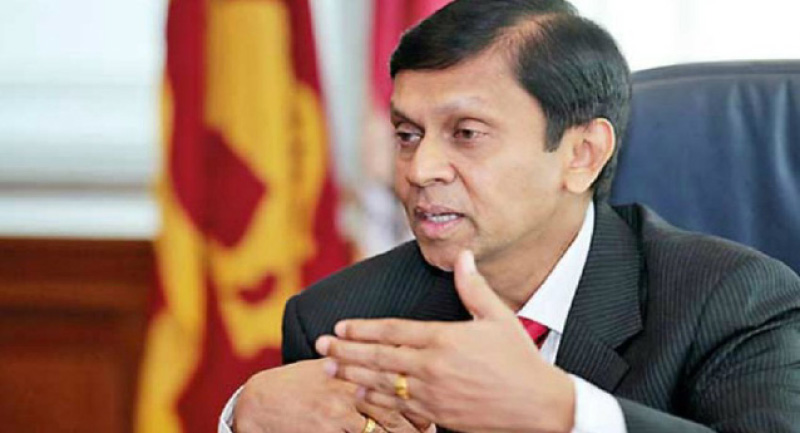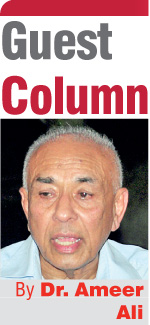Monday Feb 23, 2026
Monday Feb 23, 2026
Friday, 28 May 2021 00:00 - - {{hitsCtrl.values.hits}}

State Minister Nivard Cabraal
 State Minister Nivard Cabraal recently issued a statement to the media that total lockdown of the country for 14 days, as epidemic experts urged, would cost the nation Rs. 15 billion per day.
State Minister Nivard Cabraal recently issued a statement to the media that total lockdown of the country for 14 days, as epidemic experts urged, would cost the nation Rs. 15 billion per day.
Assuming that the Minister got his calculation right, and that it is irrational to sacrifice the economy in fighting against the pandemic, there is a nagging suspicion that the authorities, by not listening to the experts, are trying to play politics with the pandemic.
First of all, an islandwide shut down for two weeks alone is insufficient to stop the virus spreading. It also needs in addition, PCR testing of all individuals and vaccinating at least all adults. That will expose the reality of prevailing inadequacies in the public health system, which because of historical neglect, is ill-equipped and understaffed to take on this massive campaign.
This is why the regime prefers the second-best solution of shutting down only those GS divisions that have been identified as infected areas. Travel to and from these divisions are expected to prevent inter-community transmissions. The country is now paying a heavy price for its Government’s long-term neglect of the public health system.
The question is this: which is more effective, an islandwide PCR testing and vaccination of the whole nation while the country remains shut down for two weeks, or, continuing with the current strategy of isolating only the infected areas and testing only those found with symptoms? It is a cruel choice indeed, and both will cause public discontent and criticisms. Yet, the first strategy would inflict greater short-term pain and bring greater long-term gain while the second would lessen both.
The cumulative loss to the economy caused by the second would be substantially higher than the daily Rs. 15 billion that the Minister is reluctant to lose for two weeks.
Moreover, with the new strain of the virus proving to be deadlier than the previous, the number of victims is reported to be increasing daily and may eventually force the Government to listen to the experts. It may be too late by then to prevent a national disaster. Given this danger Minister Cabraal’s fear of losing Rs. 210 billion over 14 days is just pittance.
There is also an additional political benefit for the regime’s go-slow approach. There is currently a rising wave of popular discontent, if one cares to read the social media, over the way the regime has handled not only the pandemic but also the economy. The so-called alternate way of development as adumbrated by its advertisers and enthusiasts has not shown any sign of development so far. 
GR’s erratic clamp down on selected imports in the name of self-sufficiency, and his tax concessions on the import of sugar have created more problems to local producers and consumers than benefits to certain class of individuals and companies.
In short, the economic loss incurred in real terms by the vast majority of households are incalculable. Their physical and mental distress caused by loss of income, employment and savings, and by family breakdowns and social disruptions are other areas, which cannot be quantified in cash terms.
It is this failure and the search for a “turning point,” as described by Cabraal, which explains the mad rush to pass the Port City Bill in the Parliament amidst reservations by the Supreme Court.
All this is adding to a widespread discontent against the regime and the pandemic is preventing that discontent from turning into a mass movement of protest to threaten the regime’s survival. The pandemic has therefore become a saviour of the regime, and the regime is happy politicising the pandemic. How long can this go on?
With unbearable distress and frustration at the regime’s failure to ease economic difficulties and improve health conditions, people seem to have reached a point to ignore restrictions imposed by the security forces and seen moving around in search of work, income and household necessities.
An increasing number of daily arrests for breaking COVID-related rules is the result of this distress and frustration. It is pointless blaming the behaviour of people for worsening the pandemic. When the first wave of COVID-19 hit the nation, people adhered to the rules and assisted the authorities.
Sri Lanka emerged as one of the success stories in controlling the pandemic at that time. After that, rules were relaxed and whenever the rulers saw an opportunity to score political victories. There was systemic breakdown as a result.
The danger facing the country now is when the situation gets grave and security forces become punitive in maintaining control over the disobedient and rebellious. Resistance may then take different forms and may even turn violent and unpredictable.
The Opposition is divided and its reach to the masses is also restricted by the pandemic. In the meantime, the American Government has warned its citizens already to avoid travelling to Sri Lanka, partly because of COVID and partly because of the possibility of an outbreak of extremism.
There are enough disgruntled elements in the country who might resort to such foolhardiness. It would then provide a golden opportunity for the unpopular President and his power cartel to turn their de facto military regime, de jure and permanent.
(The writer is attached to the School of Business and Governance, Murdoch University, Western Australia.)